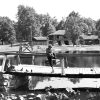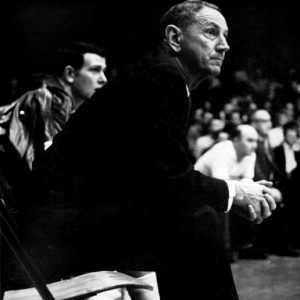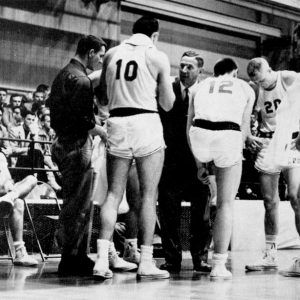calsfoundation@cals.org
Glen Rose (1905–1994)
Glen Rose was a three-sport athlete for the University of Arkansas (UA) in Fayetteville (Washington County) who dedicated most of his professional life to his alma mater with a coaching and administrative career that spanned four decades. His notable achievements included coaching UA to its first Final Four and becoming the school’s winningest basketball coach, with a record of 325 victories that stood for more than thirty years.
Glen Rose was born on April 23, 1905, in Siloam Springs (Benton County), the fourth of five children of James Rose and Fannie Franklin Rose. His father was a farm laborer, and his mother worked as a seamstress.
Rose grew up in North Little Rock (Pulaski County), “poorer than most” he recalled, and his father died when he was four years old, leaving his mother with “no means of making a living except by hard work.” Everyone in the family worked, and Rose spent summers toiling for railroads—he was part of a section gang for the St. Louis Southwestern Railway and a bridge gang for the Chicago, Rock Island and Pacific Railway—but he also delivered ice and worked for Arkansas Power and Light.
His earliest basketball memories involved playing at North Little Rock High School’s basement gym that had a dilapidated linoleum floor spread over concrete.
Rose graduated from high school in 1924 and had no college plans, but his high school coach was hired at UA, and he urged Rose to attend. At a lean 6’5″, Rose became a star Razorback athlete, earning all-conference honors in basketball and football. He also pitched and played first base for the baseball team. As a senior in 1928, he captained the basketball team to a Southwest Conference (SWC) title and an undefeated record in league play.
Rose started coaching after graduating in 1928 with a BS in education with a minor in history. He worked for one year at Jonesboro Baptist College in Jonesboro (Craighead County) and then returned to UA for a four-year stint as the freshman basketball coach. (He later earned master’s degrees in history and education.) Rose was named UA’s head basketball coach ahead of the 1934 season. Rose rejuvenated the program almost immediately, winning a share of the SWC title in his second year. Over the next four seasons, the Razorbacks won two more conference championships and never finished worse than second in league play.
Rose’s coaching style was restrained but encouraging; he eschewed haranguing his players or delivering fiery speeches. During games, he rarely left his seat on the bench. His laconic presence on the sidelines belied his wry humor and “incomparable” storytelling ability. Rose once quipped to a reporter that he did not develop players, he only watched them develop. “Notice I use the word watch them develop,” Rose said. “If I could develop them, I’d develop them some more—right now.”
Rose met his future wife while coaching UA freshmen basketball. He married Lois McMillen, of Siloam Springs, in August 1934; they had two children.
His 1936 team was selected to compete for that summer’s Olympics, the first to feature basketball. After winning a college playoff tournament, the Razorbacks were eliminated by a team from Universal Pictures that went on to win the Olympic trials. Some players from Universal helped the U.S. beat Canada to earn the country’s first basketball gold medal.
Rose’s 1941 squad went undefeated in conference play and qualified for the school’s first NCAA Tournament, where the Razorbacks reached the equivalent of the Final Four.
Rose was a lieutenant in the Army Reserve, and he was called to duty during World War II. He served two years and returned to UA in 1944—this time as head football coach. He oversaw the program with poor results and was replaced by John Barnhill.
Rose spent a year as business manager for the UA athletic department and then departed in 1947 for a four-year stretch as men’s basketball coach at Stephen F. Austin College in Nacogdoches, Texas. His Lumberjacks won the Lone Star Conference title in his first season.
A popular pick to return to Fayetteville, Rose rejoined UA in 1952. His second tenure, lasting fourteen years, was decidedly less successful than his first; the Hogs won just one conference title and had six losing seasons. Rose retired at the end of the 1966 season, citing stressors from coaching. “I’ve just been through too many last-second decisions, too many overtimes,” he said. “I have only one set of nerves, and they’ve been under constant strain for too many years.”
Rose departed UA as the school’s winningest basketball coach, with 325 victories. His twenty-three seasons marked the longest stretch for any coach in program history, and he is the only person to coach both UA’s football and basketball teams.
Rose’s achievements as a Razorback player and coach were recognized with induction into the Arkansas Sports Hall of Fame in 1964 and the University of Arkansas Sports Hall of Honor in 1988, the latter as a member of its inaugural class.
Rose planned to spend his retirement fishing—“It’s the best medicine I know for frayed nerves”—and he would often spend full days on Beaver Lake. He preferred to keep up with the Razorbacks off campus, but he did attend the men’s final basketball game in Barnhill Arena in 1993.
Rose died on September 3, 1994, five months after the Razorbacks won the national championship in men’s basketball. Rose is buried in Fairview Memorial Gardens in Fayetteville.
For additional information:
Henry, Orville. “After 23 Seasons as Arkansas Basketball Coach: Glen Yields to Duddy.” Arkansas Gazette, March 5, 1966, pp. 1B, 2B.
———. “To Start With, That $15 Tuition Almost Stopped Rose.” Arkansas Gazette, December 29, 1963, pp. 1B, 5B.
McAllister, Karen. “Glen Rose ‘Dean of the SWC’: A Modest Gentleman.” Arkansas Democrat-Gazette, September 5, 1994, p. 4B.
Tax, Jeremiah. “A Plain Man from Arkansas.” Sports Illustrated, February 24, 1958, pp. 41–42.
Brandon Howard
Fayetteville, Arkansas
 Early Twentieth Century, 1901 through 1940
Early Twentieth Century, 1901 through 1940 Recreation and Sports
Recreation and Sports Glen Rose
Glen Rose  Glen Rose on the Sidelines
Glen Rose on the Sidelines  Glen Rose Coaching
Glen Rose Coaching 



Comments
No comments on this entry yet.